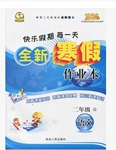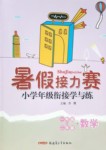
This aggressive student only wants to get into top universities.
 优秀生快乐假期每一天全新寒假作业本系列答案
优秀生快乐假期每一天全新寒假作业本系列答案 暑假接力赛新疆青少年出版社系列答案
暑假接力赛新疆青少年出版社系列答案科目:高中英语 来源: 题型:
Eric received training in computer for one year, _____ he found a job in a big company.
A. after that B. after which C. after it D. after this
查看答案和解析>>
科目:高中英语 来源: 题型:阅读理解
The common cold is the world's most widespread illness, which is plagues(疫病) that flesh receives.
The most widespread mistake of all is that colds are caused by cold. They are not. They are caused by viruses(病毒) passing on from person to person. You catch a cold by coming into contact, directly or indirectly, with someone who already has one. If cold causes colds, it would be reasonable to expect the Eskimos to suffer from them forever. But they do not. And in isolated Arctic regions explorers have reported being free from colds until coming into contact again with infected people from the outside world by way of packages and mail dropped from airplanes.?
During the First World War soldiers who spent long periods in the trenches(战壕), cold and wet, showed no increased tendency to catch colds.?
In the Second World War prisoners at the notorious Auschwitz concentration camp(奥斯维辛集中营), naked and starving, were astonished to find that they seldom had colds.?
At the Common Cold Research Unit in England, volunteers took part in Experiments in which they gave themselves to the discomforts of being cold and wet for long stretches of time. After taking hot baths, they put on bathing suits, allowed themselves to be with cold water, and then stood about dripping wet in drafty room. Some wore wet socks all day while others exercised in the rain until close to exhaustion. Not one of the volunteers came down with a cold unless a cold virus was actually dropped in his nose.?
If, then, cold and wet have nothing to do with catching colds, why are they more frequent in the winter? Despite the most pains—taking research, no one has yet found the answer. One explanation offered by scientists is that people tend to stay together indoors more in cold weather than at other times, and this makes it easier for cold viruses to be passed on.?
No one has yet found a cure for the cold. There are drugs and pain suppressors(止痛片) such as aspirin, but all they do is to relieve the symptoms(症状).?
1. The writer offered _______ examples to support his argument.?
A. 4 B. 5 C. 6 D. 3
2. Which of the following does not agree with the chosen passage??
A. The Eskimos do not suffer from colds all the time.?
B. Colds are not caused by cold.?
C. People suffer from colds just because they like to stay indoors.?
D. A person may catch a cold by touching someone who already had one.
3. Arctic explorers may catch colds when ________.
A. they are working in the isolated Arctic regions?
B. they are writing reports in terribly cold weather?
C. they are free from work in the isolated Arctic regions?
D. they are coming into touch again with the outside world
4. The passage mainly discusses ________.
A. the experiments on the common cold
B. the fallacy about the common cold?
C. the reason and the way people catch colds
D. the continued spread of common colds
查看答案和解析>>
科目:高中英语 来源:天津市南开区2009-2010学年度高一下学期期末质检试题(英语) 题型:阅读理解
第二节完形填空(共20小题,每小题1分,满分20分)阅读下面短文,按照句子结构的语法性和上下文连贯的要求,在空格处填入一个适当的词或使用括号中词语的正确形式填空。
What will the city of the future look like? No one knows for sure, and (26) ____________ (make) predictions is a risky business. But one thing is certain—they are going to get bigger before they get smaller. In the future, care for the environment will become very important as earth’s natural (27)____________ (resource) run out. We will use lots of (28) ____________ (recycle) materials, such as plastic, aluminium, steel, glass, wood and paper, and we will waste fewer natural resources. We will also have to rely more (29) ____________ alternative energy, such as solar and wind power. All this seems certain, (30) ____________ there are plenty of things about city life in the future which are not certain.
B
Public transport (31) ____________ (provide) a cheap way to get around in Beijing. There are 20,000 buses and (32) ____________ (trolleybus) in Beijing, but they can get very (33) ____________ (crowd). It’s a good idea to avoid public transport during the (34) ____________ hour (6:30 am - 8:00 am and 5:00 pm - 6:30 pm). Fares are cheap, (35) ____________ (start) at 1 yuan. Air-conditioned buses cost more.
C
We use “learned” body language when we are (36) ____________ (introduce) to strangers. Like other animals, we are on guard until we know it is safe to (37) ____________ (relax). So every culture has developed a formal way to greet strangers, to show them we are not (38) ____________ (aggress). Traditionally, Europeans and Americans shake hands. They do this with the right hand—the (39) ____________ (strong) hand for most people. If our right hand is busy (40) ____________ (greet) someone, it cannot be holding a weapon.
D
We left the docks (41) ____________ a beautiful afternoon. The sun was shining (42) ____________ (bright) as we sailed downstream through a hilly region. Men (43) ____________ (ride) bamboo rafts along the river’s edge and coal boats went past. As the sun set we docked at Fengdu. We could see the sun (44) ____________ (set) behind the white pagoda. It was beautiful.
We slept through the first gorge, (45) ____________ is called the Qutang Gorge.
查看答案和解析>>
科目:高中英语 来源:天津市南开区20092010学年度高一下学期期末质检试题(英语) 题型:填空题
第二节完形填空(共20小题,每小题1分,满分20分)阅读下面短文,按照句子结构的语法性和上下文连贯的要求,在空格处填入一个适当的词或使用括号中词语的正确形式填空。
What will the city of the future look like? No one knows for sure, and (26) ____________ (make) predictions is a risky business. But one thing is certain—they are going to get bigger before they get smaller. In the future, care for the environment will become very important as earth’s natural (27)____________ (resource) run out. We will use lots of (28) ____________ (recycle) materials, such as plastic, aluminium, steel, glass, wood and paper, and we will waste fewer natural resources. We will also have to rely more (29) ____________ alternative energy, such as solar and wind power. All this seems certain, (30) ____________ there are plenty of things about city life in the future which are not certain.
B
Public transport (31) ____________ (provide) a cheap way to get around in Beijing. There are 20,000 buses and (32) ____________ (trolleybus) in Beijing, but they can get very (33) ____________ (crowd). It’s a good idea to avoid public transport during the (34) ____________ hour (6:30 am - 8:00 am and 5:00 pm - 6:30 pm). Fares are cheap, (35) ____________ (start) at 1 yuan. Air-conditioned buses cost more.
C
We use “learned” body language when we are (36) ____________ (introduce) to strangers. Like other animals, we are on guard until we know it is safe to (37) ____________ (relax). So every culture has developed a formal way to greet strangers, to show them we are not (38) ____________ (aggress). Traditionally, Europeans and Americans shake hands. They do this with the right hand—the (39) ____________ (strong) hand for most people. If our right hand is busy (40) ____________ (greet) someone, it cannot be holding a weapon.
D
We left the docks (41) ____________ a beautiful afternoon. The sun was shining (42) ____________ (bright) as we sailed downstream through a hilly region. Men (43) ____________ (ride) bamboo rafts along the river’s edge and coal boats went past. As the sun set we docked at Fengdu. We could see the sun (44) ____________ (set) behind the white pagoda. It was beautiful.
We slept through the first gorge, (45) ____________ is called the Qutang Gorge.
查看答案和解析>>
科目:高中英语 来源: 题型:阅读理解
第二节 完形填空(共20小题,每小题1分,满分20分)阅读下面短文,按照句子结构的语法性和上下文连贯的要求,在空格处填入一个适当的词或使用括号中词语的正确形式填空。
What will the city of the future look like? No one knows for sure, and (26) ____________ (make) predictions is a risky business. But one thing is certain—they are going to get bigger before they get smaller. In the future, care for the environment will become very important as earth’s natural (27)____________ (resource) run out. We will use lots of (28) ____________ (recycle) materials, such as plastic, aluminium, steel, glass, wood and paper, and we will waste fewer natural resources. We will also have to rely more (29) ____________ alternative energy, such as solar and wind power. All this seems certain, (30) ____________ there are plenty of things about city life in the future which are not certain.
B
Public transport (31) ____________ (provide) a cheap way to get around in Beijing. There are 20,000 buses and (32) ____________ (trolleybus) in Beijing, but they can get very (33) ____________ (crowd). It’s a good idea to avoid public transport during the (34) ____________ hour (6:30 am - 8:00 am and 5:00 pm - 6:30 pm). Fares are cheap, (35) ____________ (start) at 1 yuan. Air-conditioned buses cost more.
C
We use “learned” body language when we are (36) ____________ (introduce) to strangers. Like other animals, we are on guard until we know it is safe to (37) ____________ (relax). So every culture has developed a formal way to greet strangers, to show them we are not (38) ____________ (aggress). Traditionally, Europeans and Americans shake hands. They do this with the right hand—the (39) ____________ (strong) hand for most people. If our right hand is busy (40) ____________ (greet) someone, it cannot be holding a weapon.
D
We left the docks (41) ____________ a beautiful afternoon. The sun was shining (42) ____________ (bright) as we sailed downstream through a hilly region. Men (43) ____________ (ride) bamboo rafts along the river’s edge and coal boats went past. As the sun set we docked at Fengdu. We could see the sun (44) ____________ (set) behind the white pagoda. It was beautiful.
We slept through the first gorge, (45) ____________ is called the Qutang Gorge.
查看答案和解析>>
湖北省互联网违法和不良信息举报平台 | 网上有害信息举报专区 | 电信诈骗举报专区 | 涉历史虚无主义有害信息举报专区 | 涉企侵权举报专区
违法和不良信息举报电话:027-86699610 举报邮箱:58377363@163.com